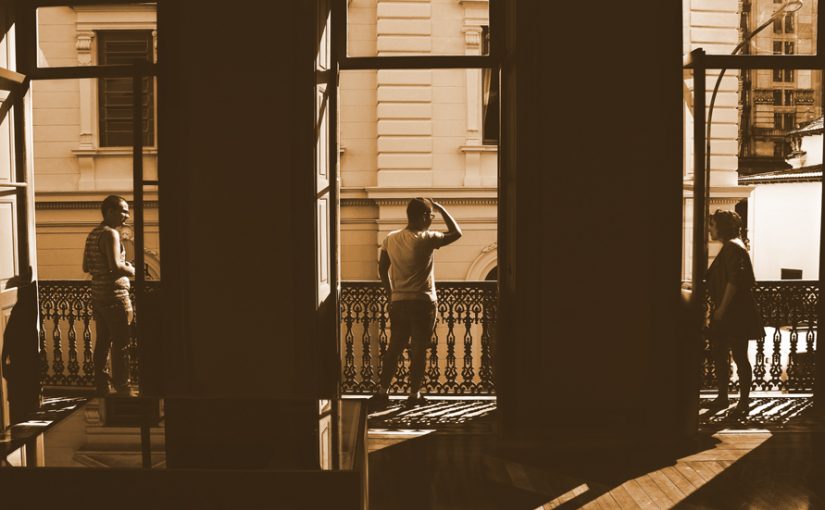A homily for the First Sunday of Advent, November 28, 2021
Jer 33:14-16, 1 Thes 3:12—4:2, Lk 21:25-28, 34-36
In 1965, John McPhee’s book profiling Bill Bradley, “A Sense of Where You Are,” hit the shelves. In it, the then-student athlete at Princeton University explained how he was able to accurately fire a basketball through the hoop by maintaining, literally, a sense of where he was on the court.
Bradley, who distinguished himself as an Olympian, a New York Knick, a U.S. senator from New Jersey and a true statesman — among innumerable accomplishments — has kept that sense of where he is not only physically but emotionally, psychologically and spiritually throughout his life and career.
Advent challenges us to do the same.
We have thousands of examples from every discipline and field of endeavor to draw upon. We have everyday life.
We look left, look right, and then look left again before crossing the street.
After 9/11, the slogan became “If you see something, say something” — implying that we should always be looking.
Drill sergeants bark “Stay alert!” and military trainees shout back “Stay alive!”
And even today’s readings from Scripture have a life-or-death tone of vigilance to them, which we are best-served to frame in a First Century apocalyptic context. We should remember just how gloomy the Apostles and Evangelists could be as they charted their journey to spread the Good News. They knew they would not always be welcomed as they preached a radical transformation to altruism throughout a complacent and selfish world. They knew not everyone would recognize the joy enmeshed in Christ’s peace, the joy we have come to know in our present day.
So they kept a sense of where they were.
As we should.
We start with honing our physical senses: listening instead of merely hearing, looking instead of simply seeing.
Bill Bradley attributed much of his sense to his extraordinary natural peripheral vision, which he expanded by exercising it. Looking, and not merely seeing.
Advent challenges us to exercise and refine our physical senses, to see and not look away or close our eyes, to hear and not pretend to be deaf. To let in the world, from the very edges of our reality.
Every one of us can see and hear the need for justice and equality in the banners and shouts of the oppressed among us. And there are many, many of our sisters and brothers suffering among us, all too many of them on the periphery, out of our direct line of sight.
We see when we look and we hear when we listen.
GPS tells us where we are … physically, anyway. As a point on the map, anyway. And that’s a start, but only a start.
Advent challenges us to have a sense of where we are emotionally, philosophically and spiritually.
And then …
Advent challenges us to exercise and hone our inner senses.
Are we actively choosing to believe, and what to believe? Or are we going through the motions ritually because habits are hard to break? Separation from the community we call Church during the pandemic lockdowns broke a lot of Sunday-go-to-meeting habits and exposed the depth, or lack of depth, in some of our faith. Can we make our peace with some of the uncomfortable ways God makes us rethink what we’re convinced we know about how to live in this world on our way to the next?
Do we have a good relationship with our loving God? Is hanging out with the Trinity part of our daily lives? Do we know where God likes to hang out with us, and what God likes to talk about with us? Do we speak the same language?
The prophet Elijah found God by listening for the soft yet clear voice of the Almighty in the gentle breeze. Are we visiting quiet places or the thin places where the distance between Heaven and Earth seems to disappear?
Advent challenges us to exercise and hone all our senses, blended.
We see and hear, we think and feel, we pray and ask for Wisdom, and we act.
We start with acts of charity and kindness according to our God-given skills and our current situation. Then, as circumstances allow and warrant, we progress to acting to end injustice, to rooting out why some people’s lives are Hell on Earth. Toward trying to snuff out the fires of evil.
Advent challenges us to always, always, always be ready to obey the Two Great Commandments, by maintaining a sense of how to, first, care for ourselves so that we then can care for our neighbors anytime, anywhere, in any way necessary, as God’s hands on Earth, for the love of God.
Advent challenges us to know where we are within ourselves so we can know where we are in the world. And so that we might, just might, have a sense of where we are in God’s plan for humanity’s growth and salvation.
